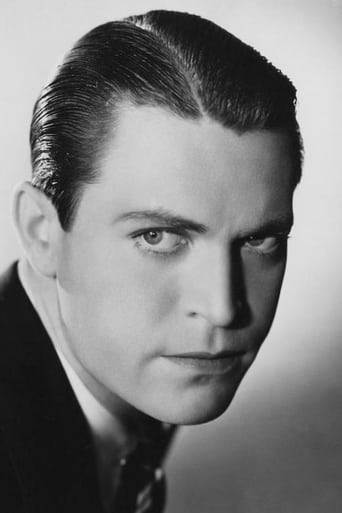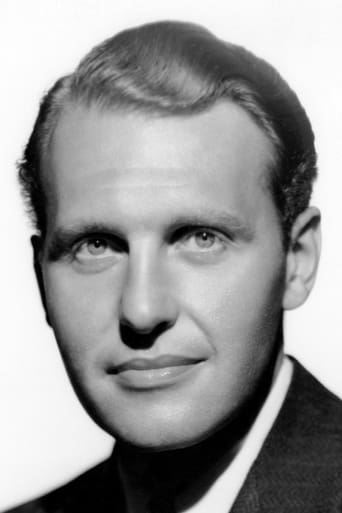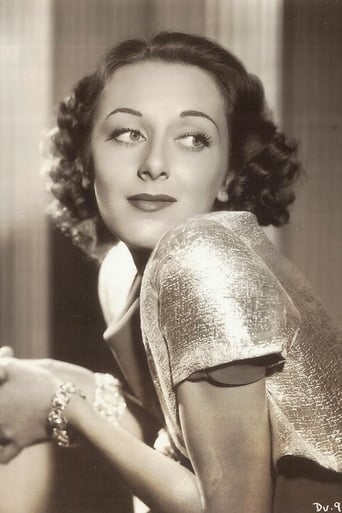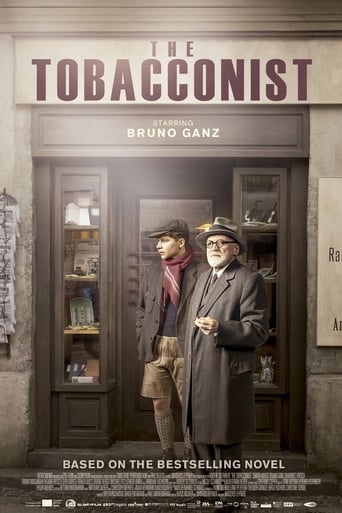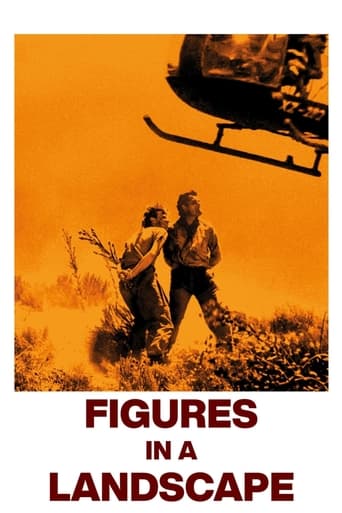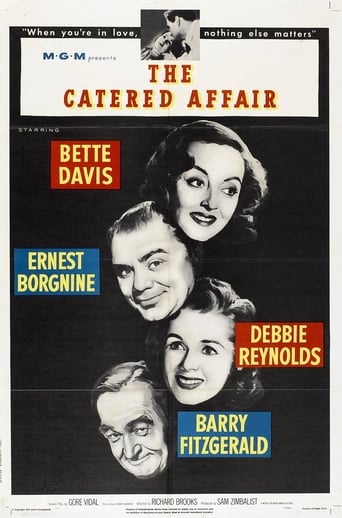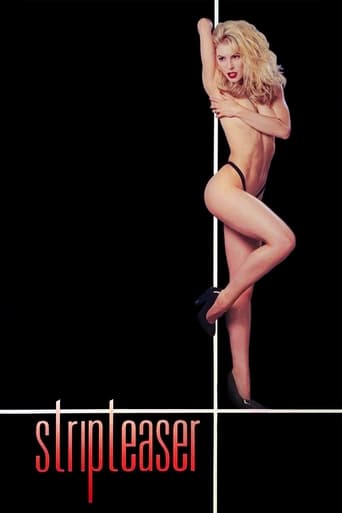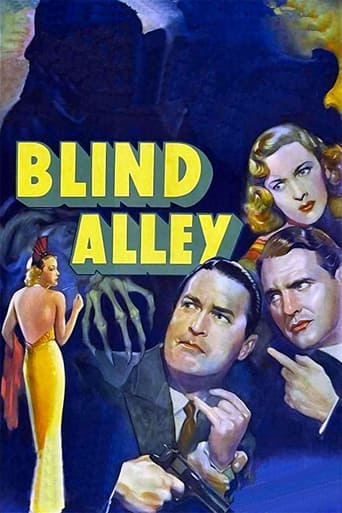
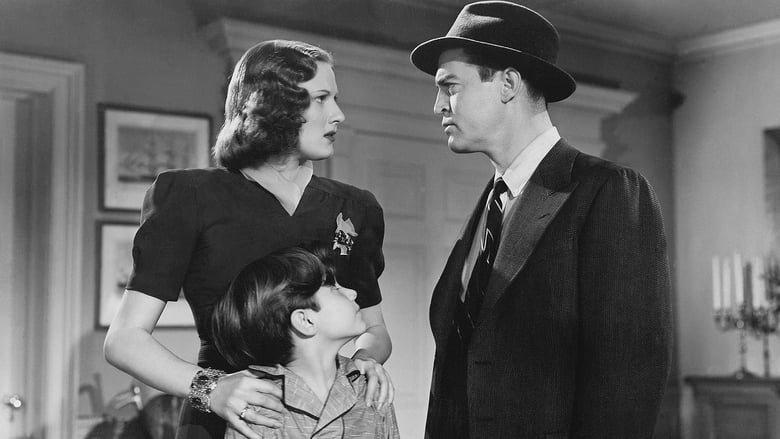
Blind Alley (1939)
A gangster takes a doctor and his family hostage.
Watch Trailer
Cast
Similar titles
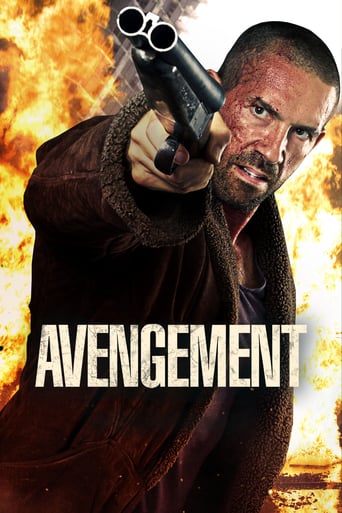
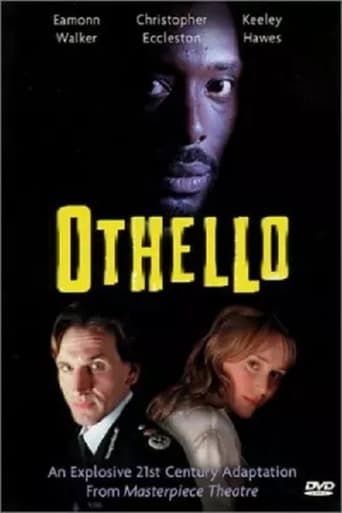
Reviews
Very disappointed :(
I don't have all the words right now but this film is a work of art.
While it is a pity that the story wasn't told with more visual finesse, this is trivial compared to our real-world problems. It takes a good movie to put that into perspective.
One of the worst ways to make a cult movie is to set out to make a cult movie.
Psychology professor Ralph Bellamy finds himself the victim of the type of criminal he's been studying and teaching students about when a violent gangster (Chester Morris), newly escaped from prison, busts in on his evening dinner party, taking him and his family and his guests hostage. This is an early variation of "The Desperate Hours", but the criminal will find that the tables will be turned on him when Bellamy vows to his wife (Joan Perry) that he will use his knowledge to destroy Morris in order to save them all, especially after Morris shoots and kills one of Bellamy's favorite students in cold blood.It's very ingenious and well crafted, and Bellamy's description to Morris about how the brain works is quite interesting, focusing on the conscience and sub conscience parts and how the conscience refuses to allow the sub conscience to enter that part of the brain in fear of being destroyed. Even a criminal with a violent nature like Morris has an issue that could destroy him, and here, Bellamy uses Morris's dreams in order to get to that sub conscience. In one of the best filmed dream sequences in film history, Morris reveals through his sub conscience the fears he's been living with all of his life. This makes his mistress (a very nervous Ann Dvorak) angry and threatens more violence.Excellent both in its analytical matter and exposition that is never "teachy", "Blind Alley" is an early film noir where the mind is both the villain and the hero. The cast is uniformly excellent, although I'd have to describe Melville Cooper's character as a stupid fool whose actions could get everybody killed. Bellamy and Morris play each other like a chess game, an ironic twist of fate considering the chess board uniquely featured in Bellamy's den. This was remade less than a decade later as "The Dark Past" which explored even more of its film noir elements, but the original version is equally as thrilling.
When I wrote a review of the remake of Blind Alley that starred William Holden I had not yet seen this nor had investigated the Broadway play from where this film came from. I've come to some interesting conclusions as a result.Chester Morris plays the killer role in Blind Alley which is a combination of The Petrified Forest and The Desperate Hours and the viewer will recognize parts of both those classics. Morris and his gang are on the run having just busted out of prison where they took the warden hostage and Morris kills him. He then takes refuge at the lakeside home of Ralph Bellamy and wife Rose Stradner who happen to be entertaining guests at the time.Bellamy is a psychiatrist who teaches and after Morris coldbloodedly murders Stanley Brown one of his students he thinks the only way to save his and everyone else's lives is to get into his head. Bellamy is a cool customer doing this, especially with friends and family's lives at stake. When Lee J. Cobb played the part of the psychiatrist in The Dark Past he was detached almost clinical in the way he probed at Holden. Bellamy is not looking at this as an experiment and now having seen both films I can say Bellamy's interpretation was superior.Blind Alley originated as a play on Broadway by James Warwick with a 119 performance run in the 1935-36 season. Looking at that cast I saw that George Coulouris played the psychiatrist and this is one instance where we are so unfortunate that he did not do either movie version. Coulouris would really have been special in the part.This film is a real sleeper from Columbia Pictures, don't miss it if ever broadcast again.
Ralph Bellamy had an unusually rich acting career that many people fail to notice some seventeen years after his death. I have had occasion (such as reviewing THE AWFUL TRUTH and TRADE WINDS) of noting his wonderfully goofy doofus characters. But he was also responsible for good dramatic performances, most notably as Franklin Roosevelt in the film SUNRISE AT CAMPOBELLO and later in the television series THE WINDS OF WAR, and even some dandy murderous villains from time to time. But then he was also filmdom's Ellery Queen. His lifetime Oscar, given to him at the tail end of his acting career, was well merited. Would that the Academy had done the same for other stars, such as the just deceased Richard Widmark.This film, BLIND ALLEY, was shown on Turner Classic Film Network last night, and I had never seen it - but I was aware of it. The plot of BLIND ALLEY was used a decade later for the early William Holden - Lee J. Cobb thriller THE DARK PAST. It is the Holden movie (where he plays the role played by Chester Morris here) that people see more frequently, probably because it is William Holden starring. This is unfair not only to Bellamy's well restrained thinking hero, Dr. Shelby, but also to Morris' villain, Hal Wilson. Morris was one of Hollywood's busiest leading men in the early talkies period, but by 1939 he was relegated to leads in "B" features. Bellamy was doing yeoman work in supporting roles in the late 1930s, when not returning to the Broadway stage. He was in the other lead role in this film (possibly the actual lead role). If Morris's lead here is a sign of his decline as a leading man, it was a sign of Bellamy's rise in film stardom when he played Dr. Shelby.Story is simple. Dr. Shelby is a psychiatrist, and a professor of psychiatry. His star pupil is Fred Landis (Stanley Brown), who is leaving college to start a new job in another state. Shelby invites Landis to his home for a going away party that night. Also in the house are Shelby's wife Doris and son Davy (Rose Stradner and Scotty Beckett), his close friend George Curtis and his wife Linda (Melville Cooper and Joan Perry), and a friend of the Curtises, novelist Dick Holbrook (John Eldredge), and two servants (Agnes - Anne Doran - and Harriot - Marie Blake). The household is enjoying the evening, awaiting the guest of honor, when their peace of mind is shattered. Enter escaped murderer Hal Wilson, his mistress Mary (Anne Dvorak), and his two gang members Buck (Marc Lawrence) and Nick (Milburn Stone). As you can see it is a good cast.Having killed three more people (two guards and a warden - played by John Hamilton of "Superman" fame) - in his escape, Wilson has nothing to lose about killing anyone else. His plan is to be rescued by a boat crossing the lake in back of Shelby's home. So he and his gang take over the house, split up the various hostages (Buck watching the Curtises and Holbrook; Stone watching Doris and Davy; and the two servants tied up in the basement). Wilson and Shelby stay in the living room on the first floor and in the Doctor's study. And gradually Shelby's curiosity as a psychologist concentrates on Wilson's peculiar and violent personality. In particular two of his fingers that seem paralyzed on his right hand. Wilson keeps denying it's nothing more than from an accident, but Shelby know the fingers don't look physically damaged.The hours pass and much comes out about personalities. And this is what made BLIND ALLEY more interesting to me than THE DARK PAST. The later movie did not deal with a secondary plot involving Mr. and Mrs. Curtis and Holbrook. Curtis is a prosperous stock broker, and has been married for some time to Linda, but the marriage has hit a rut. So she has been becoming all too close to Holbrook, much to Curtis's humiliation. But during the film it is Curtis who shows more guts in facing down the gang, in particular Buck (even attempting to attack him), while Holbrook reveals increasingly how cowardly he is. In the end Linda is far less enchanted by the novelist (ironically he writes adventure stories). The interesting casting of Melville Cooper (usually playing comic bits in his films) as a middle aged man who shows his real grit when the chips are down adds to the enjoyment of this second plot.As nerves grow tenser tragedy does strike when Fred Landis shows up, and confronts Wilson and Buck. Wilson shows his answer for all problems with a sickening smile on his face. Wilson however has been having an odd dream that effects him - he hates rain as a result. Mary makes the suggestion to Dr. Shelby that maybe he could cure Wilson of this returning nightmare he has. Shelby slowly probes away at it - I will leave it to the viewer to see the film to understand what the secret is.Although psychiatry in movies seems very superficial, one has to recall that there is a time constraint in film that forces some answer within sixty to ninety to one hundred and twenty minutes for the sake of the story line. Even so the solution of the dream, and of the basis for the evil that is Wilson, is well handled (including a very stylized flashback sequence). Bellamy does not strike a false note - however angry he really is at what has happened he remains the reasonable physician throughout the probing second half of the film. Morris matches him as a hateful figure, but one who one realizes is as helpless in his own way as his hostages and shooting victims usually are. The film is quite well made, and the stars certainly live up to the quality of the script.
A couple of gangsters, led by Chester Morris and his moll, Anne Dvorak, invade the very proper and bourgeois vacation lodge of psychiatrist Ralph Bellamy and his guests, and they take the place over while waiting either for a chance to escape or a chance to shoot it out with the cops.I'll tell you something. Chester Morris couldn't have stumbled into a wronger place. The tweedy, pipe-smoking, unflappable Ralph Bellamy pegs Morris immediately as a Freudian delight. To pass the hours away, between chess games, Bellamy beings to probe Morris, gently. Why, for instance, does Morris have those hysterically paralyzed fingers? Why does he have that recurring dream about rain dripping through the hole in his umbrella? At first, Morris reacts irritably to all this "screwy" stuff. "You're screwy!", he tells Bellamy. Everything Morris, in his ne plus ultra gangsta mode, does not understand, he calls "screwy." That renders just about everything in Bellamy's greater vicinity "screwy" because Morris understands nothing of what's going on.Bellamy helpfully draws him a sort of a cartoon, illustrating the mind, according to the received wisdom of 1939. You see, this is the inside of your head. And up here is the conscious mind -- everything you know about. But down here is what we call the unconscious, the bad stuff that the conscious mind wants to forget about. There's a guardian that keeps the unconscious down where it belongs, called "the censor band." But -- are you taking notes? -- but sometimes the censor weakens, as when we fall asleep, and some of the unconscious memories and desires can creep out in disguised form and show up in our dreams. Or sometimes the forbidden memories take the form of physical symptoms, such as paralyzed hands or fingers. The wind up is that Chester Morris is cured in sixty-nine minutes by Ralph Bellamy. He'll never shoot another gun.Actually, Bellamy's explanation of psychoanalysis according to Freud isn't badly presented. I'm glad he stuck with Freud and only two levels of consciousness. If he had ever gotten into Carl Jung, who split up the personality into so many overlapping and contradictory parts that they could have spread out and still filled up the heads of a dozen ordinary neurotics -- well, the audience would have been afloat in a world of some sticky dualistic excreta.At that, though, the movie was probably interesting and educational in 1939, the year of Freud's death. Psychoanalysis was about at its peak and there may have been a certain public curiosity about just what was going on. This answers the question, though it does so in the same way that the Catholic catechism explains the mysteries of the world. "Who made the world?" "Freud made the world." A bit more than a decade later, it was remade almost shot-for-shot as the noir-sounding "The Dark Past," with William Holden running around and calling everybody "screwy." Holden is a more versatile actor than Chester Morris, but this role is so stereotyped that Morris and his clipped sneer are preferable. Still, it's of interest in reflecting certain interests, not just of 1939 or 1950, but of more enduring value. After all, Freud practically invented the subconscious single-handed, and without our grasp of psychodynamics, would we have the efficient marketing we have today of Viagra and SUVs and politicians?
